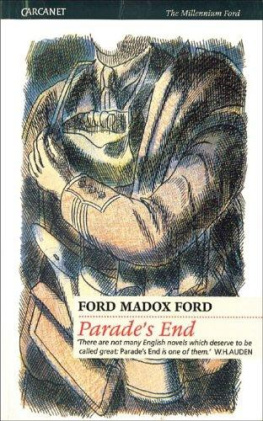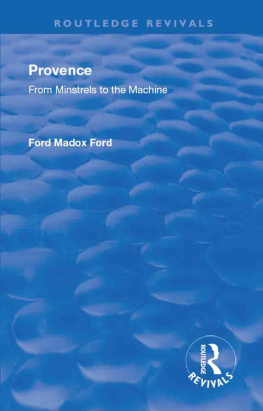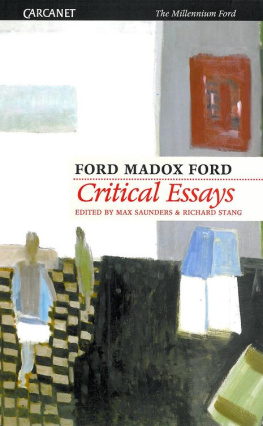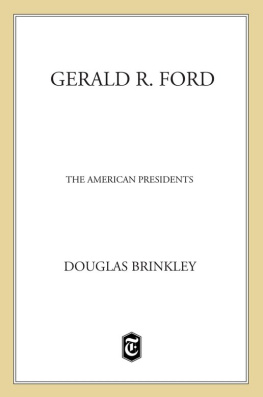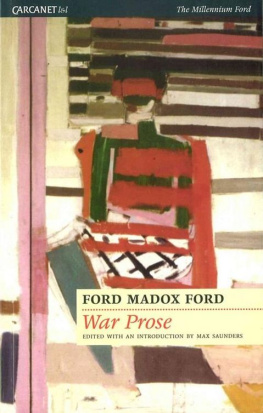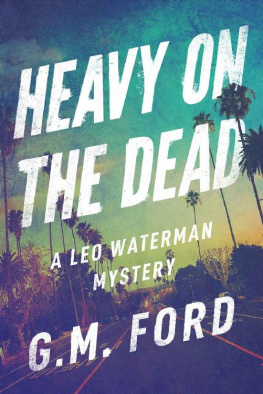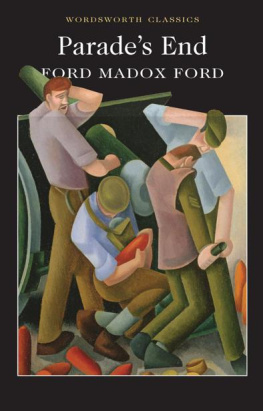Ford Madox Ford - Parades end
Here you can read online Ford Madox Ford - Parades end full text of the book (entire story) in english for free. Download pdf and epub, get meaning, cover and reviews about this ebook. year: 1953, publisher: Knopf, genre: Detective and thriller. Description of the work, (preface) as well as reviews are available. Best literature library LitArk.com created for fans of good reading and offers a wide selection of genres:
Romance novel
Science fiction
Adventure
Detective
Science
History
Home and family
Prose
Art
Politics
Computer
Non-fiction
Religion
Business
Children
Humor
Choose a favorite category and find really read worthwhile books. Enjoy immersion in the world of imagination, feel the emotions of the characters or learn something new for yourself, make an fascinating discovery.
- Book:Parades end
- Author:
- Publisher:Knopf
- Genre:
- Year:1953
- Rating:3 / 5
- Favourites:Add to favourites
- Your mark:
- 60
- 1
- 2
- 3
- 4
- 5
Parades end: summary, description and annotation
We offer to read an annotation, description, summary or preface (depends on what the author of the book "Parades end" wrote himself). If you haven't found the necessary information about the book — write in the comments, we will try to find it.
Parades end — read online for free the complete book (whole text) full work
Below is the text of the book, divided by pages. System saving the place of the last page read, allows you to conveniently read the book "Parades end" online for free, without having to search again every time where you left off. Put a bookmark, and you can go to the page where you finished reading at any time.
Font size:
Interval:
Bookmark:
Ford Madox Ford
WITH AN INTRODUCTION BY
Robie Macauley
ALFRED A. KNOPF: NEW YORK 1950
-iii-
THIS IS A BORZOI BOOK, PUBLISHED BY ALFRED A. KNOPF, INC.
SOME DO NOT... copyright 1924 by Thomas Seltzer, Inc. NO MORE PARADES copyright 1925 by Albert & Charles Boni, Inc. A MAN COULD STAND UP -- copyright 1926 by Albert & Charles Boni, Inc. THE LAST POST copyright 1928 by Albert & Charles Boni, Inc. Copyright 1950 by Alfred A. Knopf, Inc. All rights reserved. No part of this book may be reproduced in any form without permission in writing from the publisher, except by a reviewer who may quote brief passages. Published in Canada by McClelland & Stewart Limited. Manufactured in the United States of America
FIRST BORZOI EDITION
-iv-
THE YEAR BEFORE HE DIED Ford Madox Ford used to walk around the campus at Olivet College like a pensioned veteran of forgotten wars. We took him for a kind of vast, benevolent and harmless Uncle Toby, leaning on his stick in class or sitting in his dark little basement office and wheezing out his stories of Henry James as Toby might have spoken of Marlborough. His books seemed like medals achieved, perhaps, in the Crimea; and we read Auden, Kafka, Evelyn Waugh.
We were no different from the rest of the world. We knew vaguely that his Tietjens books were about the first World War and we suspected that they might be a good enough account of a soldier's disillusioning experiences--but we had read all that before. If any of us went far enough to look at the introductory letter to A Man Could Stand Up--, the third in the series, he would find Ford confirming it:
"This is what the late war was like: this is how modern fighting of the organized, scientific type affects the mind. If, for reasons of gain, or, as is still more likely out of dislike for collective types other than your own, you choose to permit your rulers to embark on another war, this-or something very accentuated along similar lines-is what you will have to put up with! I hope, in fact, that this series of books, for what it is worth, may make war seem undesirable."
A little afterward some of us went to war ourselves and later, coming back, took Ford's novels down from the shelf to see if his easy prediction had come true. It seemed impossible that we could have been so wrong.
For some peculiar reason of his own he had hoaxed us; he was
-v-
neither benevolent nor harmless and his books were by no means a simple warning as to what modern warfare is like. To read the Tietjens story for that would be like going through Henry James to improve one's manners or through Conrad to learn how to navigate a ship.
Nevertheless, this is the way the novels were taken when they were first published. They were thought to be books of "experiences" and they sold well. The reaction came when Ford's readers discovered that what he had actually given them was not another Under Fire or What Price Glory? but something complex and baffling. There was a love story with no passionate scenes; there were trenches but no battles; there was a tragedy without a denouement. Ford was quickly and easily forgotten.
We are a little older now and perhaps a little less superficial. We have been living a little longer with the great, enveloping tragedy Ford set out to describe. Perhaps in this edition we can take a second look at the Tietjens story and discover that it is less about the incident of a single war than about a whole era, more about our own world than his.
"The two young men--they were of the English public official class--sat in the perfectly appointed railway carriage." So begins the Tietjens story. Everything is excellent, comfortable, predictable: the leather window straps are of virgin newness, the mirrors immaculate, as if they had reflected very little, the upholstery a luxuriant scarlet and yellow design, the air smelling faintly of varnish. The train runs as smoothly as ( Tietjens thinks) British gilt-edged securities. Moreover, the two young men are of the class that administers the world. "If they saw a policeman misbehave, railway porters lack civility, an insufficiency of street lamps, defects in public services or in foreign countries, they saw to it either with nonchalant Balliol voices or with letters to the Times, asking with regretful indignation, 'Has the British This or That come to this?'" Under their care are manners, the arts, diplomacy, inter-imperial trade and the personal reputations of prominent men. They do not realize that their train has got on the wrong line.
-vi-
Actually it is not running from London to Rye as they think, but from the past into the future, and ahead of them on their one-way journey is a chaotic country of ripped battlefields and disordered towns. Their fellow-passengers will grow hysterical and unpredictable, station masters will put up the wrong signals, troops will come aboard and get off again, the good furnishings of the train will get worn and broken, the schedule will go to pieces. And, experiencing all this, Christopher Tietjens will learn to expect that somewhere, beyond some bridge or tunnel, the tracks themselves will finally disappear into the dry sands of the wasteland.
But to begin where Ford did we must return to take a look at the unsuspecting passenger as he sits in his comfortable seat at the start of the journey. The beginning of the Tietjens story took form in Ford's mind just after the war. He had returned to France and was spending the summer in Harold Monro's villa on the deserted Riviera, a discharged officer, a cast-off writer immersed in a sense of disaster. As he walked in the garden of the Villa des Moulins, his ideas, cloudy at first but growing more precise, began to gather around the memory of an old friend, now dead.
Arthur Marwood had been enough of a paradox in himself to suggest greater ones. He was the son of a good Yorkshire country family, a mathematician of brilliance in the government office of statistics and Ford's associate in publishing The English Review. His mind was "acute and scornful" Ford says. "He possessed the clear Eighteenth-century English mind which has disappeared from the earth, leaving the earth very much the poorer." However, "he was, beneath the surface, extraordinarily passionate--with the abiding passion for the sort of truth that makes for intellectual accuracy..." In spite of his brilliance, Marwood had no career.
It was tuberculosis, actually, that forced him into a retired and inactive life, yet Ford, going beyond that, saw a tragedy of disinheritance. His kind of intelligence and what it represented passed through the metamorphosis of the author's imagination and became Christopher Tietjens. "I seemed," Ford says, "to see him stand in some high place in France during the period of hostilities taking in not only what was visible but all the causes and all the motive powers of infinitely distant places. And I seemed to hear his infinitely scornful comment on those places. It was as if he lived again."
So Marwood furnished the outline and the intellect, but there had to be more to Tietjens than that alone. Through the course of the
-vii-
four books the development of his personality is one of the most elaborate and singular accomplishments of modern writing.
His character is synonymous with the character of an ordered, bounded, and harmonious past. Socially, this means the England of gentry and farms before the middle classes built it into an empire. Morally, it means a code of honor and self-respect in contrast to business honesty and puritan habits. It means that Tietjens is humane in his relationships, feudal in his outlook, Christian in his beliefs, a classicist by education, a Tory in politics. He is, in fact, "the last English Tory." Mirrored in this "clear Eighteenth-century mind," the world is an equable and logical mechanism in which God, Man, and Nature have a balanced relationship. It is not specifically an English view; it has belonged to every Western nation.
Font size:
Interval:
Bookmark:
Similar books «Parades end»
Look at similar books to Parades end. We have selected literature similar in name and meaning in the hope of providing readers with more options to find new, interesting, not yet read works.
Discussion, reviews of the book Parades end and just readers' own opinions. Leave your comments, write what you think about the work, its meaning or the main characters. Specify what exactly you liked and what you didn't like, and why you think so.

